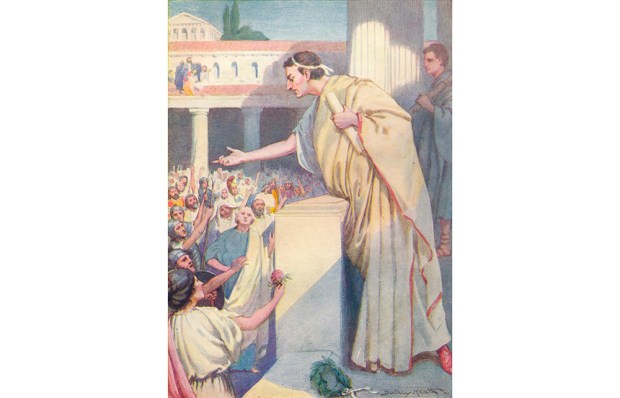The presenters of the BBC 2 programme on civilisations seem unable to decide what civilisation is. Socrates would therefore wonder how they could make a programme about it. Still, that’s academe for you. Let the Romans help out.
First, the root of ‘civilisation’ is Latin civis, ‘citizen’. That implies a law-bound society. Secondly, in his epic Aeneid, Virgil described how Aeneas, fleeing Troy in flames to found the Roman race, consulted his father Anchises in Hades on the future that awaited him. Anchises duly ‘foresaw’ the whole history of Rome down to Virgil’s day, and defined Rome’s mission: the arts and science, he said, were for others (he meant the Greeks), but Rome’s raison d’être was ‘to rule an empire, teach the ways of peace, spare the defeated and overpower the arrogant’. No civilisation, then, without peace — which could be won, in the ancient world, only by war — and the fruits of war, wealth.
‘Law-bound society’, ‘peace’ and ‘wealth’ added up to the conditions under which civilisation could flourish. What then would be its product? Otium, Latin for ‘leisure’. For the plebs, that meant state-sponsored bread and circuses (= circuits, i.e. chariot races). We might call that — within its limits — enlightened social policy. For the educated, otium meant high culture, learnt from the Greeks: the freedom to speculate about the wonders of the natural world, study literature and the arts, argue about e.g. history, ethics, justice and so on; and commission superb works of art and literature. The whole package came under the term humanitas.
At this point there will be the usual pious howls about slaves and women and the poor and human rights. But our ‘enlightened’ world still has much to learn here. Even Jeremy Corbyn could not disagree with Cicero that justice arose from ‘love of fellow humans’ or that humanitas demanded that the ‘comfort, safety and needs’ even of barbarians should be respected.
Wonderful works of art can, of course, be produced under any conditions. But civilisation is far more than works of art: it includes the best that Man has thought, said and created, and the freedom to engage with and build on it.
Got something to add? Join the discussion and comment below.
Get 10 issues for just $10
Subscribe to The Spectator Australia today for the next 10 magazine issues, plus full online access, for just $10.
You might disagree with half of it, but you’ll enjoy reading all of it. Try your first month for free, then just $2 a week for the remainder of your first year.













Comments
Don't miss out
Join the conversation with other Spectator Australia readers. Subscribe to leave a comment.
SUBSCRIBEAlready a subscriber? Log in